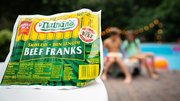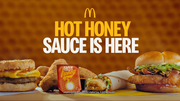Article
Chicken wars
KFC may have a tough time competing in the grilled chicken category.

May 19, 2008
KFC's new grilled chicken product is a year away from hitting the market and already some are predicting it is destined for the cultural dust pile along with New Coke and Zima.
In February, KFC announced that it was working on a new line of grilled chicken items that would be rolled out nationally in 2009. David Novak, CEO of KFC parent Yum Brands, said the goal was to give the company a more youthful and healthy image.
The grilled chicken will have between 60 to 180 calories and 3 to 9 grams of fat compared to the Original Recipe fried chicken which has 130 to 360 calories and 8 to 24 grams of fat.
The historic chain will be re-branded Kentucky Fried and Grilled Chicken.
Matt Friedman, CEO and founder of Wing Zone, said KFC is making a bold statement but could also be making a major mistake. Anytime a company with a loyal customer base decides to drastically alter its signature product it risks alienating the people responsible for its initial success.
"I think someone who likes KFC for its original or extra crispy fried chicken may not be someone who wants a piece of grilled chicken," Friedman said. "I think there are other chains out there that do a good job from a grilled chicken perspective and you don't see them getting into fried chicken."
KFC's poor track record in previous forays into non-fried chicken products such as rotisserie chicken also casts a black cloud over its current initiative, said Brian Darr, managing director of restaurant consulting firm Datassential.
"McDonalds did great with salads and snack wraps and Burger King struggled for years but they've really come around, developing new products that have resonated with their core customers and now they're on the road to recovery," Darr said. "But you can't look to KFC and say that they have had a homerun with anything they've done."
A new playing field
In order for this to be successful, KFC's core customers need to embrace the new grilled chicken offering, he said.
"If their core customer doesn't really care,then they have an issue because the only other thing they can do is attract non-KFC buyers," he said. "And that pits them against Boston Market which is really known for non-fried chicken and an up-and-coming brand like El Pollo Loco which has been doing well in all the markets they're in. It's certainly a departure from what they're really known for and I don't know if that will resonate well with consumers."
Steve Carley, president and CEO of El Pollo Loco, said not only is he unconcerned about KFC moving into their territory, he sees it as a positive.
"Any conversation about the healthier nature of grilled chicken has to benefit us because we're the experts and the gold standard," Carley said. "I'm very pleased that the single biggest player in the chicken category and the one with the biggest budget is going to tout the benefits of grilled chicken."
But to pull offits new marketing campaign, KFC is going to have to negotiate an incredibly difficult balancing act in order to avoid disparaging its core product, Carley said.
"How do you come out with a massive new marketing campaign talking about the healthful benefits of non-fried chicken without shooting yourself in the foot?" he said. "But I expect them to be very aggressive. Any time you change your name from Kentucky Fried Chicken to Kentucky Fried and Grilled Chicken it's a big deal. They'll roll out the big guns."
| |||||
 | Free Special Publication Downloads Download informative guides, special reports, case studies and white papers for free. | ||||
Aaron Allen, CEO of Quantified Marketing, has a more positive take on KFC's venture into grilled chicken given the success and marketing muscle of its parent company, Yum Brands.
Everyone points to KFC's previous failures when it tried to branch out from fried chicken, but that occurred under different ownership, Allen said. Yum Brands, however, has succeeded when it rolled out new products in its other chains — Pizza Hut and Taco Bell — so it has a proven track record.
"The Yum marketing group is one of the best restaurant marketing groups out there and it is one of the best run companies in the world," Allen said. "And being a restaurant consulting company we normally find things to pick at. But they just do such a great job. And I think this move to healthier products falls in line with the repositioning they did a few years back when they dropped the name from Kentucky Fried Chicken to KFC. This seems like part of that same evolutionary path."
Maintaining quality
But no matter how many marketing dollars are put behind KFC grilled chicken, the only thing that matters is the quality of the product, Carley said. And one significant difference between KFC's grilled chicken and El Pollo Loco's is that KFC's isn't actually grilled, it's roasted. KFC cooks its chicken in an oven on grooved plates to give it the appearance of being grilled.
Another obstacle is that grilled chicken doesn't lend itself to the standard KFC-operating procedure and it will take time for both the franchisees and the customers to adapt to the change, Carley said.
"If you go into a KFC now, you'll see pieces of fried chicken sitting in staging bins under heat lamps. It's very easy to maintain inventory and have availability of product for consumers when you can do that. But grilled chicken doesn't lend itself to that process. We make ours fresh for each order and that's why KFC struggled in the past."
Competitors of KFC that serve fried products such as Popeye's, Church's and Wing Zone, are not expected to rush out with their own grilled chicken concepts to keep pace, Darr said.
"If this becomes a huge hit and a few years down the road, if it's still a product that's doing well, they may take another look at it. But right off the bat the feeling is that KFC may be straying away from what made them successful. So I think all these guys will sit on the sideline and see how this transition goes and give it a couple of years."
 ChatGPT
ChatGPT Grok
Grok Perplexity
Perplexity Claude
Claude








